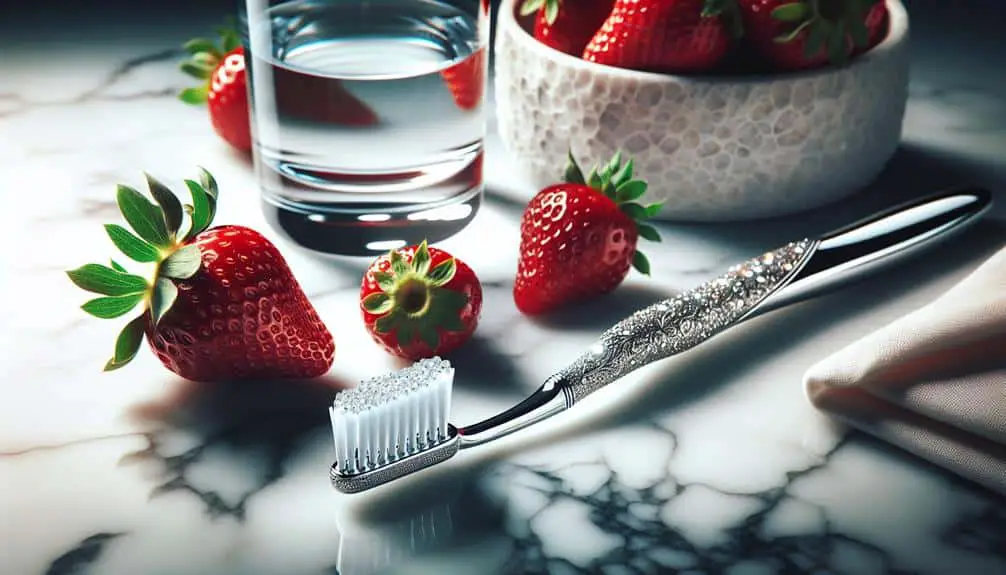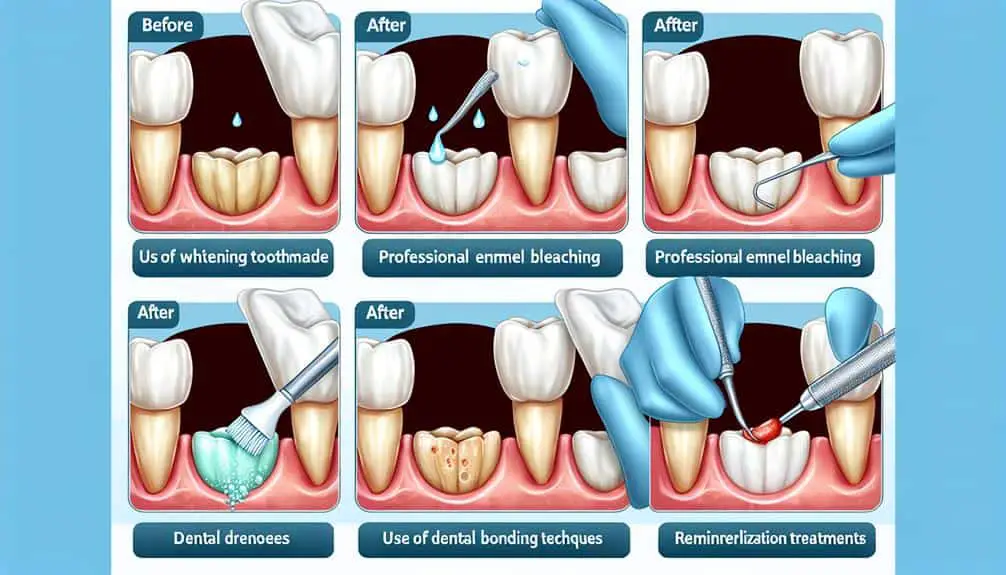To keep your enamel healthy while whitening, opt for dentist-recommended methods to minimize damage. Steer clear of harsh chemicals and abrasives that can harm your teeth. Be cautious with DIY options like baking soda to avoid potential damage. Prioritize sensitivity prevention, especially when whitening, and consider desensitizing toothpaste for comfort. Remember, there's more valuable information ahead on maintaining enamel health for a radiant smile.
Key Points
- Use dentist-recommended whitening methods to minimize enamel damage.
- Avoid harsh chemicals and abrasive materials for safe whitening.
- Opt for professional whitening for higher safety and efficacy.
- Consider natural remedies like oil pulling and green tea for enamel health.
- Maintain enamel by limiting acidic foods and increasing calcium intake.
Causes of Enamel Damage
Enamel damage commonly occurs due to acidic foods and drinks eroding the protective layer of your teeth. The enamel, the outermost layer of your teeth, is essential for safeguarding against decay and sensitivity. Preventive measures play a vital role in maintaining the integrity of your enamel.
One key preventive measure is being mindful of your diet. Foods high in acidity, such as citrus fruits, sodas, and sugary treats, can weaken the enamel over time, making it more susceptible to damage. To counteract this, it's advisable to consume these acidic foods in moderation and rinse your mouth with water after consumption to help neutralize the acids.
Your diet significantly impacts the health of your enamel. Incorporating enamel-friendly foods like dairy products, leafy greens, and crunchy fruits and vegetables can help strengthen your enamel. Additionally, maintaining good oral hygiene practices such as regular brushing with fluoride toothpaste and flossing can further protect your enamel from erosion caused by acidic substances.
Safe Whitening Methods
To effectively whiten your teeth while ensuring the safety of your enamel, consider utilizing dentist-recommended whitening methods. Dentist-recommended whitening methods are often the paramount option as they're specifically designed to minimize enamel damage while effectively brightening your smile.
When exploring safe whitening methods, it's essential to avoid harsh chemicals or abrasive materials that can erode your enamel over time. DIY alternatives, such as baking soda or hydrogen peroxide, may seem cost-effective but can be damaging if not used correctly.
It's pivotal to prioritize sensitivity prevention when whitening your teeth. Look for whitening products that are specifically formulated for sensitive teeth or consult your dentist for recommendations. Additionally, using a desensitizing toothpaste before and after whitening treatments can help reduce any discomfort.
Natural Remedies for Enamel
Explore incorporating natural remedies into your dental care routine to promote enamel health and strengthen your teeth. When exploring ways to naturally care for your enamel, herbal remedies and DIY solutions can be effective options. Here are five items to explore:
- Oil Pulling: Swishing coconut or sesame oil in your mouth can help reduce harmful bacteria and promote enamel health.
- Green Tea: Drinking green tea regularly can provide antioxidants that may help strengthen your teeth and protect enamel.
- Aloe Vera Gel: Applying a small amount of aloe vera gel to your gums can soothe irritation and support gum health, indirectly benefiting enamel.
- Baking Soda: Mixing a small amount of baking soda with water to create a paste can act as a gentle abrasive to help remove surface stains on teeth.
- Vitamin D: Ensuring you have sufficient vitamin D levels through sunlight exposure or supplements can aid in enamel remineralization and overall dental health.
Professional Whitening Options
For effective teeth whitening, explore professional options offered by dental professionals. While DIY whitening kits and home remedies can be tempting, professional whitening options provide a higher level of safety and efficacy. Dental professionals can offer in-office treatments that are tailored to your specific needs, ensuring that your enamel health is prioritized throughout the whitening process.
Professional whitening options often involve the use of stronger whitening agents compared to over-the-counter products. These agents are applied with precision by trained professionals, minimizing the risk of damage to your enamel. Additionally, dental professionals can customize the treatment to address any specific concerns you may have, such as tooth sensitivity or existing dental work.
In-office whitening treatments are designed to provide noticeable results in a shorter amount of time compared to DIY methods. The controlled environment of a dental office allows for a more efficient and effective whitening process, giving you a brighter smile without compromising the health of your enamel. Consider consulting with a dental professional to explore the professional whitening options available to you.
Maintenance Tips for Enamel
Explore simple yet effective ways to maintain the health of your enamel for long-lasting whitening results. To guarantee enamel protection and support the whitening process, it's vital to adopt good dietary habits. Here are five essential tips to help you uphold your enamel health:
- Limit Acidic Foods and Beverages: Acidic foods and drinks can erode enamel over time, leading to sensitivity and discoloration.
- Increase Calcium Intake: Calcium-rich foods like dairy products, leafy greens, and almonds can help strengthen enamel and shield against erosion.
- Drink Plenty of Water: Water helps rinse away food particles and neutralize acids that can harm enamel.
- Avoid Sugary Snacks: Sugary snacks can contribute to the growth of harmful bacteria in the mouth, leading to enamel damage and cavities.
- Chew Sugar-Free Gum: Chewing sugar-free gum can help stimulate saliva production, which aids in remineralizing enamel and maintaining a healthy pH balance in the mouth.
Frequently Asked Questions
Can Enamel Damage Be Reversed Completely Through Whitening Methods?
Enamel damage can't be completely reversed through whitening. Enamel remineralization can strengthen it, but whitening techniques may not fully repair erosion. Understand the limitations of whitening effectiveness in restoring enamel health for best dental care.
Are There Any Long-Term Risks Associated With Professional Whitening Options?
When considering professional whitening options, be aware of potential long-term risks. Precautions like consulting with a dentist, using recommended products, and following instructions can help safeguard enamel health. Safety considerations are crucial for lasting results.
How Often Should I Whiten My Teeth to Maintain Enamel Health?
To maintain enamel health, consider whitening your teeth every 6-12 months. This frequency balances a whiter smile with enamel protection. Alternatives like gentle whitening toothpaste or professional treatments under supervision can also help safeguard enamel while achieving desired results.
Can Certain Foods or Drinks Help Strengthen Enamel While Whitening?
Boost your enamel strength naturally with dietary benefits. Certain foods and drinks can provide enamel protection while whitening. Consider incorporating natural remedies for enamel strengthening to maintain a healthy and radiant smile.
Are There Any Specific Toothpaste or Mouthwash Products That Can Help Protect Enamel During Whitening Treatments?
To protect your enamel during whitening, look for toothpaste and mouthwash with enamel protection features. Some products contain fluoride or calcium to strengthen enamel while whitening. Natural remedies like baking soda can also promote enamel health.



